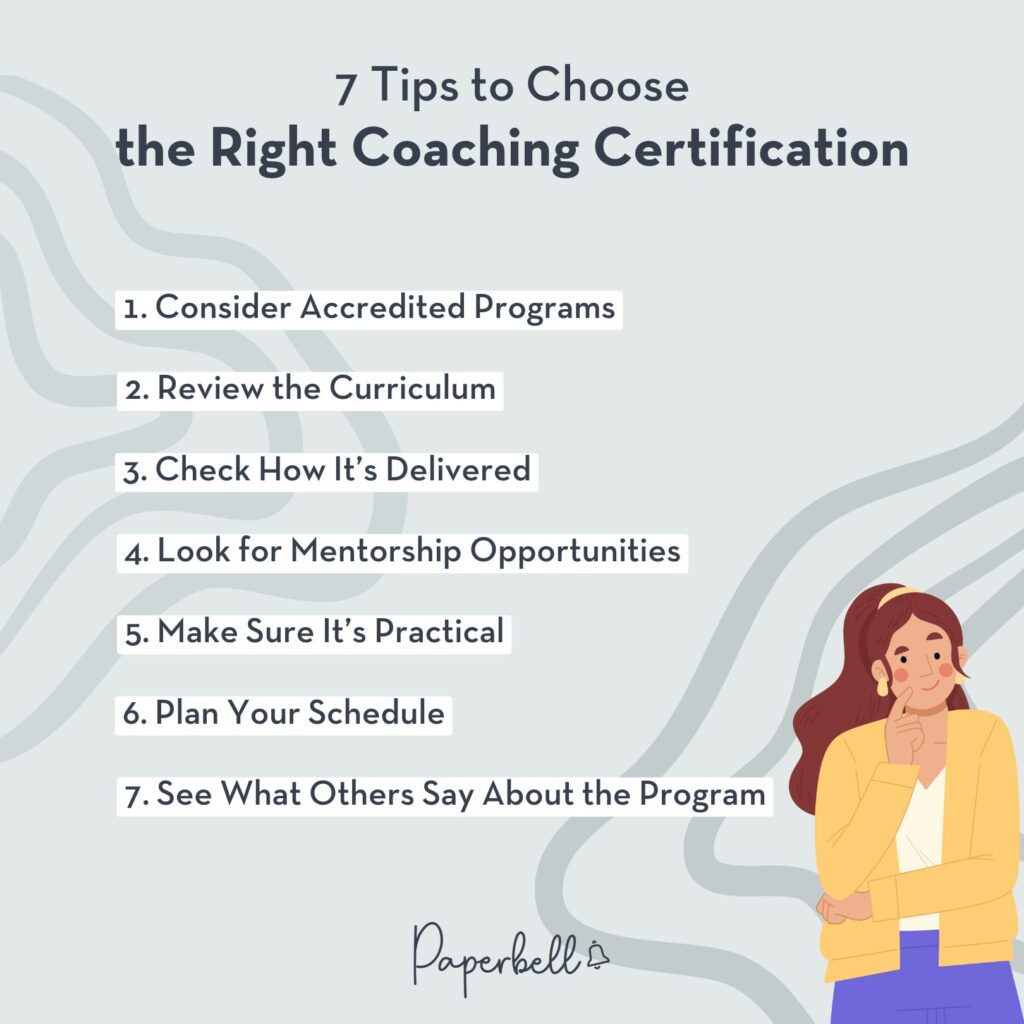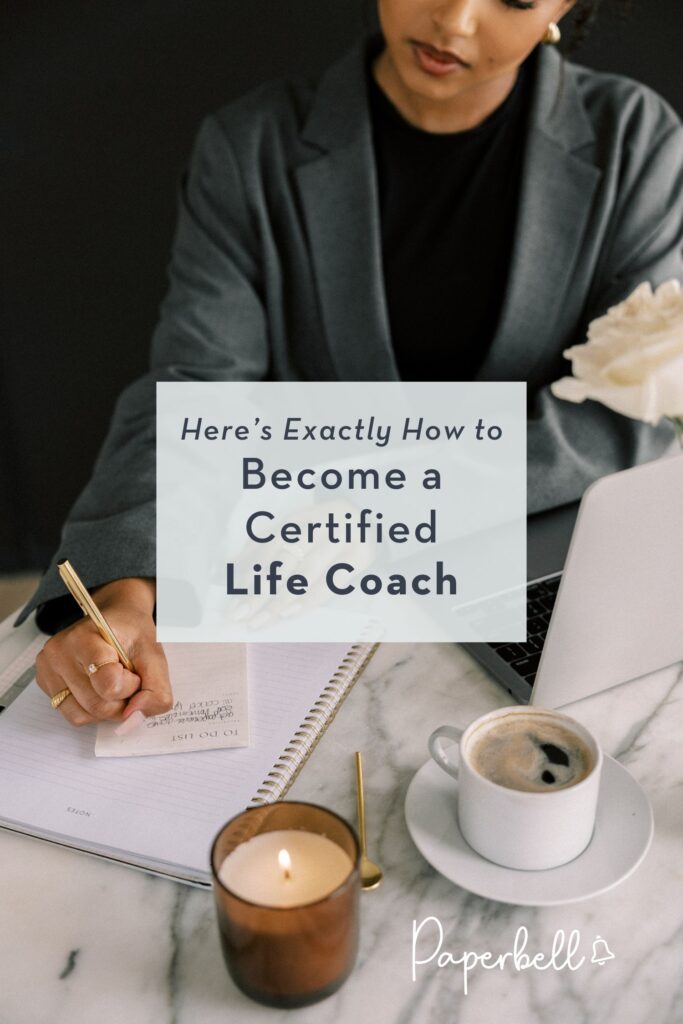Getting certified can be an important step in your coaching career. Though not a prerequisite, certification enhances your credibility and equips you with the methodology and ethical guidelines needed to make a lasting impact on clients.
In this post, we’ll guide you through becoming a certified life coach, from choosing the right training program to starting your own coaching practice.
What Is a “Certified Life Coach?”
A certified life coach is a professional who has completed a coach training program and earned certification from a reputable organization or association.
This certification verifies that the coach has met specific standards of education, practical coaching experience, and ethical conduct as outlined by recognized bodies like the International Coaching Federation (ICF) or the Center for Credentialing & Education (CCE).
Certification also assures clients that their coach has undergone rigorous training in evidence-based coaching techniques and adheres to industry standards.
An example of a certified coach is Lisa Marie. As a Certified Trauma Recovery Coach, she helps her clients navigate the unseen impacts of trauma and chronic stress.

Do I Need a College Degree to Get Certified as a Life Coach?
No, you don’t need a college degree to become a certified life coach. Most certification programs focus on practical coaching skills and ethical guidelines rather than formal education.
Depending on the coaching niche, some advanced programs may require experience in related fields, such as counseling, psychology, or business. So make sure you check the specific requirements of a program before applying.
[ Read: Life Coaching 101: Exactly How Much Does It Really Cost To Become A Life Coach? ]
7 Tips to Choose the Right Coaching Certification

The right program provides you with essential coaching skills and methodology while ensuring you have the credibility and credentials to attract clients.
Here are some tips to help you choose one.
1. Consider Accredited Programs

When choosing a coaching certification, it’s wise to consider programs accredited by reputable organizations like the International Coach Federation (ICF), the European Mentoring and Coaching Council (EMCC), or Certified Professional Coach (CPC).
These organizations set rigorous standards for coaching education, covering essential competencies, ethical guidelines, and training hours.
Opting for an accredited program ensures your certification is recognized globally and signals to potential clients or employers that you’ve completed a comprehensive and credible training process.
While non-accredited programs may still offer value, accredited ones provide an added layer of trust and professionalism in a competitive field.
2. Review the Curriculum
When choosing a certification program, review the curriculum to ensure it aligns with your coaching goals.
Look for courses that cover essential topics like core coaching competencies, ethics, client communication, tools for goal-setting, and techniques to help life coaches identify obstacles for their clients. To specialize in a specific coaching niche, you may look for programs with niche-specific training, like business or wellness coaching.
Many certification courses also teach you how to attract and retain clients—an invaluable skill for new life coach practitioners starting their practice.
3. Check How It’s Delivered
Certification programs come in various formats, so it’s important to choose one that suits your lifestyle and learning style.
Options include self-paced online life coach training, live virtual classes, in-person workshops, or a blend of these methods. Online programs offer flexibility, while live or in-person classes provide opportunities for real-time interaction and feedback.
Be sure to confirm the program structure to ensure it works for you.
4. Look for Mentorship Opportunities
Ongoing support is key as you navigate your coaching career. Many courses offer mentorship with experienced coaches as part of the package.
Being part of a community where you can receive feedback is extremely valuable, so see if your course offers continued support upon finishing the program.
5. Make Sure It’s Practical
You can learn all the theory but unless you get the chance to put it into practice, you may feel lost as you start working with your first coaching client.
Comprehensive coaching programs allow you to practice skills like fostering a personal coaching presence, ensuring you feel prepared to engage meaningfully with clients. Some also provide session recordings with experienced coaches so you can observe the application of coaching models and questions.
Look for programs that give you the chance to practice what you learn straight away.
6. Plan Your Schedule
Does the course schedule fit your weekly routine? Can you free up enough time to complete all classes, studying, and practice hours?
Some certification programs are full-time, while others allow for bite-sized learning. Some can be completed in a few weekends, while others are spread across a year.
Choose a program that aligns with your availability so you can stay committed and make the most of your certification.
7. See What Others Say About the Program
Student reviews can offer valuable insight into what a certification program is really like. Look for feedback on the quality of teaching, course materials, and support provided.
Reviews can also reveal whether the program delivers on its promises, like helping students land their first clients or feel prepared to coach with confidence.
Here are a few programs we’ve covered on our blog with real student reviews:
- Center for Creative Leadership
- NeuroLeadership Institute
- Institute of Positive Psychology
- Erickson Coaching
- Coach U
- iNLP Center
- iPEC
- Robbins-Madanes Life Coach Certification
- Jay Shetty Certification School
- Coachville
- Co-Active Training Institute
What’s the Best Life Coach Certification Program?
The best life coach certification for you depends on your individual goals, learning style, and budget. For example, if you have a niche in mind, you may go for a program that helps you specialize in it right away.
The Health Coach Institute is one of the organizations that offer a reputable program with both health and life coaching modules. The curriculum is based on behavioral psychology and neuroscience, is self-paced, and can be completed in about six months.

However, if you want to go deeper into life coaching and learn how to run your practice, the Coach Training Alliance’s program could be a better fit.
It provides a hands-on approach, emphasizing the practical application of coaching skills and business strategies. This program includes both self-paced and scheduled components over six months.

Ultimately, the best life coach certification is the one that resonates the most with your values and needs—none is one-size-fits-all. Consider programs that:
- Matches your value system
- Have graduates in careers or niches you want to get into
- Provide practical, hands-on coaching experience, not just theoretical knowledge
- Offer ongoing support or mentorship after certification
- Are transparent about their success rates and alumni outcomes
- Allow some flexibility to tailor the program to your specific coaching interests or goals
- Provide opportunities for networking and building connections within the coaching community
How Do I Know If a Life Coach Certification Is a Scam?
Marketing is a crucial part of building a coaching practice, and it’s easy to be seduced by claims of coaches making $10,000 a month on social media. But too many of these expensive “I’m going to turn you into a 6-figure coach” programs don’t teach you coaching; they teach sales!
Some of these might be appropriate for learning how to grow your business after you’ve trained as a coach, but don’t mistake them for programs that teach you real methodology.
Here are some red flags to look out for:
- Exaggerated claims: Avoid programs promising unrealistic results, like guaranteed clients or six-figure income in a short time.
- No clear curriculum: Ensure the program provides a detailed syllabus with clear skills and techniques.
- Unqualified instructors: Verify instructors have relevant coaching experience and certifications.
- High-pressure sales: Be cautious of programs using urgency or exclusive offers to push sales.
- Poor or no reviews: Look for honest reviews and avoid programs with no feedback or suspiciously positive ones.
- Unrealistic pricing: Watch out for unusually cheap or expensive programs without justification.
- All theory, no practice: Ensure the program includes practical coaching experience, not just theory.
- Hidden fees: Be aware of additional costs for materials or assessments not disclosed upfront.
Remember, the life coaching industry is unregulated, so you will find many coaches trying to sell courses with false or exaggerated promises—another reason why choosing a certification from a credible organization is worth it.
How to Get Your Life Coach Certification
So you’ve chosen a certification that fits your needs, and you fulfill all its prerequisites. Great! Here’s how to complete your program and get your hands on it.
- Complete the training: Go through the required coursework, including classes and practice hours.
- Log your coaching hours: Many certifications require you to complete and record a certain number of hours coached.
- Pass your exam: Some programs require you to pass an exam to demonstrate your knowledge of coaching principles, ethics, and techniques.
- Apply for certification: Depending on the program, you may be awarded certification from the training organization or through an accredited body like ICF.
Make the most of your certification program by attending group and peer coaching sessions, being active in Q&As, and connecting with others in your cohort.
Certified Life Coach FAQs
Can You Get Your Life Coach Certification Online?
Yes, many life coach certification programs offer online training with flexible schedules, including self-paced or live online classes— and this doesn’t mean they are any less effective than in-person courses.
You are sure to find one that you can attend in your PJs. Yes, life is good that way!
How Much Do Life Coaching Certification Programs Cost?
Comprehensive life coaching certifications generally range from $2,000 to $10,000 or more, depending on the program’s length, level of personalized support, and accreditation.
While you can find cheap or free coaching programs online, they aren’t comparable to the more robust alternatives offered by major coaching organizations.
That said, you can always take a free program first (if you have the time) before you commit to a more extensive alternative.
How Long Does It Take to Become a Life Coach?
Becoming a life coach typically takes an average of 3 to 12 months, depending on the program and required practice hours.
Some free coaching courses will certify you in a couple of hours, but they won’t provide the same depth of training and credibility that accredited programs offer.
Get Ready to Start Your New Career
So, what do you say? Have we illuminated the mysteries of certified professional life coaching? Oh, good.
Whether you want to start coaching full-time or do it on the side, we hope you now have all the answers about getting started.
Once you’re ready to take on clients, Paperbell can help you streamline your coaching business from bookings to payments, contracts, and more.

Paperbell automatically generates a beautiful, easily customizable coaching website for you with all your client management processes plugged into it.
Try Paperbell today for free with your first client.

Editor’s Note: This post was originally published in May 2023 and has since been updated for accuracy.









